Virtual Conference: Oct 16, Oct 22, Oct 29
Security constitutes a central issue in Indian politics. India is the world’s largest democracy and with almost 1.4 billion people the second largest country in the world. India’s population is also highly diverse, which is illustrated by that fact that it has 22 constitutionally recognized languages, to cite just one indicator. India is one of the biggest and fastest growing economies in the world, and its economy is varied including a large technology sector. From an international security perspective, India’s role is crucial for regional and global stability, and India is a strategic partner for the United States.
In recent decades India has made major strides to improve different dimensions of security for its population. For example, life expectancy has increased by approximately 25 years since World War II and by about 8 years in the last two decades. Between the late 1990s and early 2000s, the number of people living in extreme poverty was halved and another 90 million people were lifted out of extreme poverty between 2011 and 2015. Poverty elimination and improved public service access for rural and urban populations remain a key goal for the country. Education provides one example: Between 2012-13 and 2015-16, the net enrollment in upper primary school has increased by 10 percent, and especially girls’ access to education has improved: now, there are 102 girls for every 100 boys in upper primary school, compared to just 90 two decades ago.
India has ambitious goals and is seeking to stimulate economic growth and promote inclusion and sustainability through comprehensive policy approaches to human development, social protection, financial inclusion, rural transformation, infrastructure development, access to sanitation, health care, and housing, and environmental sustainability in line with the United Nation’s Sustainable Development Goals.
Yet, significant challenges to security remain. Although the economy has grown rapidly, development has been uneven across population groups and geographic areas. India is an emerging major space power, but also faces border conflicts, foreign policy challenges, and internal conflicts and tensions. Despite the country’s adoption of policies to improve gender equality, gender inequities remain. The slowing economic growth of recent years has been amplified by the Coronavirus pandemic, which has led to a massive economic contraction that will severely impact further progress in advancing India’s goals to promote and sustain security for its population.
This conference explores pertinent issues in the areas of international, domestic, and human security and provides a forum for leading researchers to discuss politics and security in India. Each session addresses a variety of topics that together provide multiple perspectives on progress and challenges in the politics of security in India.
You can choose to attend one or more of the following sessions here:
Session 1:
Date: October 16, 11:00 a.m. – 12:30 p.m.
Title: Water, Gender, and Border Security
Moderators: David Dumke, Rebecca Schiel
Arkaja Singh, Centre for Policy Research in India
Title: Securing Access to Drinking water in Indian Cities: The Local Interface of Law, Government and People
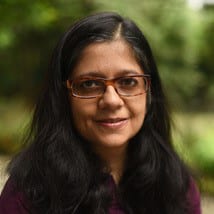
Biography: Arkaja Singh is a Fellow at the Centre for Policy Research (CPR) and a part of the recently formed State Capacity Initiative at CPR, where she is responsible for developing a new program of research on state capacity in Indian cities. Her areas of interest include municipal government, informal settlements, land, water and sanitation (and especially the issues around sanitation labor and manual scavenging.) Arkaja recently completed a study of state response to India’s ‘crisis of hunger’ brought about by the CoVID-19 pandemic, considering issues of ‘state capacity’ in the organization and delivery of the response. Other recent work includes a study of federal relations in the context of water governance in India. She has previously over a decade of experience in development sector consulting and research.
Brian Turnbull, University of South Florida
Title: Evading Gender Quotas: Reservations and Proxies in India

Biography: Brian Turnbull is a Visiting Instructor of Interdisciplinary Social Sciences at the University of South Florida Sarasota-Manatee, focusing on comparative politics and American government. He holds a PhD in political science with a focus in comparative politics and international relations from the University of Kansas. Prior, he received his MA in Security Studies from Georgetown University. His research agenda focuses on the use of gender quotas to improve representational equality in the global South. Dr. Turnbull conducted Fulbright-funded fieldwork in India, where he gathered interviews from city councilors in Jaipur, Rajsathan. He participated in the Faculty Development Seminar India (Council of American Overseas Research Centers). Dr. Turnbull’s research and teaching interests are in democratic representation, gender and politics, South Asian politics, and ethnic conflict. His scholarship has been published in journals such as Qualitative Research and Journal of International Women’s Studies.
Debidatta Aurobinda Mahapatra, University of Central Florida
Title: Contested Security on the Himalayas: India-China Border Conflict and its Wider Implications
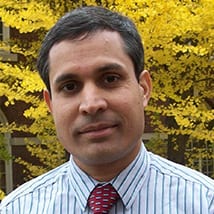
Biography: Debidatta Aurobinda Mahapatra holds a PhD in Conflict resolution from the University of Massachusetts Boston, USA and a PhD in International Studies from Jawaharlal Nehru University, India. His areas of interest include ethnoreligious conflicts, peacebuilding, global south, and India. He has published several books including Conflict Management in Kashmir (Cambridge UP), Gandhi and the World (Lexington), and Conflict and Peace in Eurasia (Routledge). His articles have appeared in journals such as Geopolitics, Regional and Federal Studies, and Sage Research Methods Cases. He has taught and researched at the Central University of Punjab, the University of Mumbai and the University of Jammu, India. He received the Scholar of Peace Award (New Delhi) in 2007 and Kodikara Award for Young South Asian Researcher (Colombo) in 2010. He was a Visiting Fellow at Institute for Conflict Research, Belfast, UK; Charles Wallace Fellow at Queen’s University Belfast; and ICSSR-RAS Fellow at Institute of Oriental Studies, Moscow. He has worked as a consultant for the Internal Displacement Monitoring Centre, Geneva. Mahapatra is currently an Adjunct Professor of Political Science at the University of Central Florida, and at Valencia College, Florida. He is also associated with the Center for Peace, Development and Democracy, University of Massachusetts Boston as Fellow and with the International Mediating and Negotiating Operational Agency (EPOS), Rome, Italy as a Senior Research Fellow.
Session 2:
Date: October 22, 4:00 – 5:30 p.m.
Title: Historical and New Perspectives on the Politics of Security
Moderators: Jonathan Powell, Rebecca Schiel
Shyam Tekwani, Daniel K. Inouye Asia-Pacific Center for Security Studies
Title: Riots, Witch Hunts, Electocracy: India’s New Security Order?
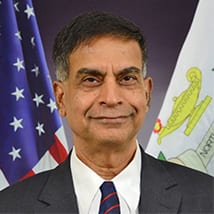
Biography: Shyam Tekwani is professor at the Daniel K. Inouye Asia-Pacific Center for Security Studies where he specializes in political violence, terrorism and counterterrorism; security dynamics of South Asia and the role of media in security. Tekwani has authored and co-authored several books, book chapters, articles and opinion pieces including Media and Conflict Reporting in Asia; “Online Networks of Terrorist Groups and their Implications for Security”; “The Internet in the 2004 Sri Lankan Elections”; “Two Indias: The Role of the Internet in the 2004 National Elections”; and “The Media, Information Revolution and Terrorism in Southeast Asia.” Tekwani’s extensive background in the media as a journalist reporting conflict and insurgency in the Indo-Asia Pacific includes his exclusive reportage of the ethnic conflict in Sri Lanka. His move to academics converged with the parallel shift of insurgencies and propaganda to the Internet in the early-90s and his early academic work focused on the use of new media technologies by terrorists and insurgent groups. He has taught courses and lectured widely across countries at universities and institutions, including the last decade at the School of Communication Studies in the Nanyang Technological University, Singapore. A native of India, Professor Tekwani earned a B.A. (Honors) in history and comparative religion from Visva-Bharati University, Santiniketan, and an MFA in Photography from the Maryland Institute College of Art, Baltimore.
Sanjib Baruah, Bard College
Title: Nation, Nation-building and Postcolonial Sovereignty: A View from a Borderland
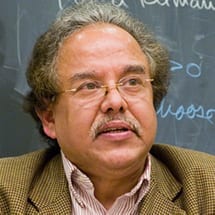
Biography: Sanjib Baruah is a Professor of Political Studies at Bard College. He holds a BA from Cotton College, Guwahati, India; an MA from the University of Delhi, and a Ph.D. from the University of Chicago. Baruah’s teaching and research interests include political economy, nations and nationalism, Asian borderlands, and South Asian Politics. His publications include India against Itself: Assam and the Politics of Nationality; Durable Disorder: Understanding the Politics of Northeast India; Postfrontier Blues: Towards a New Policy Framework for Northeast India; and the edited volumes Beyond Counterinsurgency: Breaking the Impasse in Northeast India; and Ethnonationalism in India: A Reader. His opinion pieces appear in the Indian Express and other newspapers. Baruah serves on the editorial board of the journal Studies in Indian Politics and the book series South Asia in Motion from Stanford University Press. He holds a concurrent position as Global Fellow at the Peace Research Institute in Oslo, Norway.
Rochisha Naraya, University of Central Florida
Title: The Economics of Gendered Regulation: Widows, Patrilineages and Law in Early Colonial India
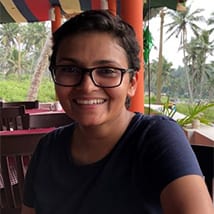
Biography: Rochisha Narayan is a historian of Early Modern and Modern South Asia. She is interested in exploring histories of family, community, social protests, colonialism and capital through the lenses of gender, sexuality and law. She is completing her book manuscript, tentatively titled, ‘Agents of Capital: Widows, Family, Community and Law in Early Colonial India’. It examines relationships of property during the 18th and early 19th century to show that transfers of capital were political concerns involving household, community and state. The book traces the ways in which early colonial law gained shape, and was established as an authority in 18th-century society, by mediating matters of inheritance. It explores how the colonial economy defined property relationships in this period and British interventions through law tethered household and community transactions in its service. One of the core arguments of the book is to show how these 18th-century practices of vernacular capitalism were gendered. The book focuses on the pursuits of female political and commercial actors in the transition to colonial rule. Challenging narratives which cast widows as fragile and marginal victims of culture, this project draws attention to elite and non-elite widows as agentive and entrepreneurial figures who strove to maintain a stake in colonial economy by sourcing capital and support in community spaces, and colonial offices.
In addition to this research, Dr. Narayan has begun preliminary research on a second project which is tentatively titled, “The Politics of Belonging: Family Histories in Vernacular Genealogies and the Colonial Archive in India”. This research will examine the production of genealogy and family history as contingent practices of status formation, negotiation and control in northern India from the 18th to the 20th century.
Session 3:
Date: October 29, 4:00 – 5:30 p.m.
Title: The Politics of Security: Gender, Terrorism and Space
Moderators: Rochisha Narayan, Rebecca Schiel
Seema Shekhawat, University of Central Florida
Title: Gender and Security in India
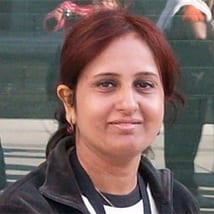
Biography: Shekhawat is a social scientist with a Ph.D. in Political Science from the University of Jammu in India. Her research and teaching interests include conflict, peace and gender, and her regional focus lies in India and South Asia. She has published several books, including Gender, Conflict, and Peace in Kashmir (Cambridge UP), Female Combatants in Conflict and Peace (Palgrave Macmillan), and Women and Borders: Refugees, Migrants, Communities (I.B. Tauris). Shekhawat has presented papers and delivered public lectures in various parts of the world, including France, Germany, United Kingdom, Indonesia, Nepal, Philippines and the United States. Most recently she delivered a talk on women warriors at the Learning Institute for the Elderly (LIFE) at the University of Central Florida. Shekhawat is a recipient of the Scholar of Peace Award (Women in Security, Conflict Management and Peace, New Delhi), the Berghof Foundation Fellowship (Berlin) and the International Peace Research Association Foundation Fellowship (USA). She has previously conducted research and taught at the Universities of Jammu and Mumbai, India. She has also been a consultant to the Internal Displacement Monitoring Centre, Norwegian Refugee Council. Her experience also includes working as a consultant for the Conflict and Peace Studies Center, Kathmandu and EPOS, Rome. She was the guest editor for a special issue of the Journal of Internal Displacement, which focused on displaced women. She is a member of the editorial boards of the Journal of Internal Displacement, and Research Papers, the journal of the Human Rights Conflict Prevention Centre, University of Bihac, Bosnia. Moreover, she is a member of several organizations, including Dignity and Humiliation Studies, Action Asia and Women in War.
Anup Phayal, University of North Carolina at Wilmington
Sambuddha Ghatak, San Jose State University
Title: BJP Policies and Terrorist Violence in India

Biography: Anup Phayal is an assistant professor of Political Science at the University of North Carolina at Wilmington. His scholarly interests lie at the intersection of International Relations and Comparative Politics, focusing on political violence and post-conflict peace building. His research has been published in journals such as International Studies Quarterly and the Journal of Global Security Studies. He has also published reports and policy papers for the Asia Foundation. Phayal holds a Ph.D. in Political Science from the University of Kentucky and Master’s degrees from the London School of Economics, UK, and Tribhuvan University, Nepal. Prior to joining UNC Wilmington, he held a post-doctoral position at the Baker Center at the University of Tennessee, Knoxville.
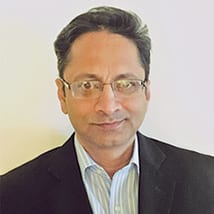
Biography: Sambuddha Ghatak is an assistant professor in the Department of Justice Studies at San Jose State University. Sambuddha received his Ph.D. in Political Science from the University of Tennessee in 2014. His research interests include International Relations: Intrastate Conflict; Politics of Terrorism; International Conflict; International Organizations; International Relations Theory, Comparative Politics: Politics of Developing Nations; South Asian Politics; Government and Politics of India. Before joining the Department of Justice Studies in 2017, he was a lecturer at the University of Tennessee since 2014. He has taught a wide range of classes, including Terrorism, Conflict Processes, and American Government and Politics. Ghatak has published on the subjects of terrorism and human rights in journals such as Journal of Conflich Resolution, Conflict Management and Science, International Interactions and Terrorism, and Political Violence.
Roger Handberg, University of Central Florida
Title: Changing Horses in Mid-Stream: The Indian Space Program

Biography: Roger Handberg, Professor of Political Science in School of Politics, Security & International Affairs, works in the areas of science and technology policy with primary focus on space policy both military and civilian. His more recent work has focused on space policy as a developmental tool. His publications include 170 plus articles and nine books, most recently on international space commerce and the Chinese space program. His work on India is part of a larger project examining global impact of China, India and Japan on future of the global space community.
Co-Sponsored by
- UCF India Center
- UCF Office of Global Perspectives and International Initiatives
- UCF College of Graduate Studies
- UCF College of Sciences
- UCF Center for Global Economic and Environmental Opportunity
- UCF School of Politics, Security, and International Affairs
- Chr. Michelsen Institute/NRC (Project #263096)
